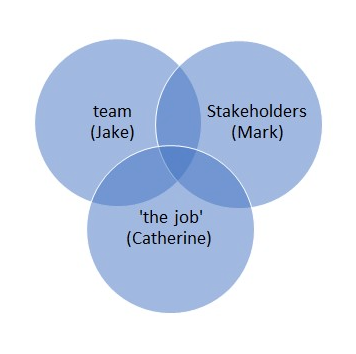Helping people has always been my passion.
What was I less passionate about? Technical accounting standards. Detailed spreadsheets. 50-page financial reports.
Here's the problem. That was part of the job.
But, I'm a smart cookie and so knowing the value of relationships and customer service in my role, I doubled-down on those activities and as for the other stuff....well, I:
• Did them last minute
• Delegated them (sometimes even delegating up!)
• Dropped the ball
(Hopefully my old bosses aren't reading this!)
Your time goes where your energy naturally flows
However, I wasn't intentionally doing it that way. It was simply the bias I had and so inadvertently let my time go where my energy flowed.
I see the same thing with the CFOs and finance leadership teams I work with.
I see that each individual has their own natural bias – usually a bias that follows their own strength and comfort zone – and this bias undermines their performance.
Meet the players
Take Jake, a general manager in finance who is a self-professed people person. Who cares deeply about his team quite often travelling around the country to meet face to face with his team members to make sure they're okay. Who will spend his time in transit to meet with his own team members instead of having the difficult conversation needed with his stakeholder to avoid collateral damage.
Then there's Catherine. Whose comfort zone is the numbers. Who loves to dive deep into a spreadsheet and solve complex problems. Who, when pressed for time or in the middle of a challenge, will be short and blunt with the people around her. Who can be perceived as brash, not customer-service oriented nor a team player.
And finally, there's Mark. Who's so good at managing up, the Board thinks he's the bee's knees. His team run around like chickens with their head cut off, wrought with the fear that they won't be able to complete the work Mark has promised the execs.
Who do you have in your team? More Jakes, Catherines or Marks?
At this stage, you might be thinking, 'it's okay, Alena. Diversity is good. As long as I have a balance of all 3 in my team, I should be alright.' Maybe. To a point I agree with you.
But, here's the thing. Unconsciously we will languish and revel in those areas of our bias. We'll have a 30-minute meeting onsite with a key stakeholder instead of a 10 minute phone call. We'll make sure the spreadsheet is beautifully formatted and we'll add a beautiful pivot table for good measure. And we'll spend 50% of our week each week in team 1:1s...every week.
Before I go on, let me make one thing clear. The above might be appropriate at any given time for your business. But I don't think there's enough time in our average work week for this to be the norm.
We need to tighten our belts
When we work with CFOs and their teams, we have a look at how they're spending their days and weeks. We look at the quality of the conversations they're having and the focus of the very many meetings that consume their days.
The many diagnostic tools we provide our leaders and teams continue to show that CFOs and their teams are not in the habit of always having the right conversations or doing the right work that will shift the dial and move the needle on team effectiveness and business performance.
This is never 100% their fault. There's always a bigger picture at play.
Focus on your circle of control
What you can – and should – do, however, is make sure you are aware of what's going on in your team. That you know the natural biases and tendencies of your team members and therefore know how to support them so that these strengths don't turn into shadows of performance.
As elegantly explained in Dr Stephen Covey's infamous Circle of Influence, it doesn't help us if we obsess over the many circumstances that sit within our circle of concern. That we're better of focusing on what's within our influence and by extension, within our control.
As I share in my book, CFO of the Future, the IMPACT quadrant - Change Leadership – is all about self-leadership. But this particular quadrant of CFO leadership is intentionally called change leadership, not self-leadership, because I believe all change starts with self. That if you want different results, you need to start by identifying what changes you can make within yourself first – because 'you' are really the only thing entirely within your control.
How to prevent your strengths turning into shadows of performance
There are many ways to do this. The key is to find the best way that suits you, your team and your context.
What I can do is share 3 of the things we do in case they might be useful ideas for you.
We:
1. Provide our CFOs and their teams the insights, tools and templates so that they can focus on implementation and influence. So that they can follow proven processes to get the job done right, but also well. We obsess about removing friction for our clients so that they can focus on financial translation, visionary decision-making and driving business value. It also prevents inadvertent and incessant inertia.
2. Create a high-performance rhythm that efficiently helps us plan our priorities and provides natural points for reflection. So that each week, we know performance is better than the week previous. So that like an elite athlete we improve over time. Without injury. This helps with pace, energy and urgency.
3. Curate an environment and culture of safety, high performance and energy. So that people can be themselves, share their concerns and challenges without fear of recourse. So that issues can come freely onto the table. After all, without transparency we're shooting in the dark.
But it starts with first understanding what's going on with your people.
Where their strengths, preferences and biases exist.
So you can support them in the most relevant way to help them grow and develop and ultimately make your boat go faster, stronger, longer.
Of the 3 mentioned above, what's your bias?
Where do you and your team need to tighten your belt?
What action would be most useful for you to take now?



